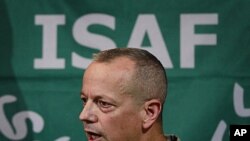The commander of coalition forces in Afghanistan, U.S. Marine Corps General John Allen, says the plan for a transition to full Afghan security control is intact after the announcement that American troops will largely end their combat duties next year, rather than the following year as had been widely expected.
General Allen took command of international forces in Afghanistan last July. Since then, his mission has been to put himself out of a job - to train Afghan troops to take over, against a weakened Taliban, by the end of 2014.
“It is a difficult job,” he says. “The Taliban continues to carry out spectacular attacks, and most Afghan troops start with a will to fight, but few professional soldiering skills.”
Then last week, U.S. Defense Secretary Leon Panetta said he hopes U.S. troops will be able to end their combat mission by late 2013, more than a year ahead of the final handover agreed to at the NATO summit in Lisbon in 2010. The announcement surprised some foreign officials and other experts, but General Allen says that was always part of the plan.
“That has been the plan all along. It has not accelerated the Lisbon-based timeline. We will continue to serve right alongside, support the ANSF (Afghan National Security Forces) through the remainder of '13, across all of '14, right to the end of '14, which was the roadmap out of Lisbon.”
Still, General Allen says while Afghan forces are to be in the lead throughout the country starting in the middle of next year, foreign troops should expect to do some fighting.
“We will never be in a situation where there is no combat or no likelihood of combat. The enemy gets a vote here. This has been a virulent insurgency. We should fully expect, as advisers always have been, that advisers when they are supporting combat forces are going to be exposed to combat.”
So the general does not expect the Taliban to give up easily. But he also rejects the findings of a secret U.S. military report leaked to the British media last week. The report says captured Taliban fighters claim their organization is stronger than Western officials say it is.
“The Taliban who are in our custody might be very interested in portraying for us that they're willing to wait until after 2014. But frankly, that's a bankrupt narrative because there's going to be an international force of some form or another aiding the ANSF long after 2014.”
Foreign help for the Afghans after 2014 will largely involve money and training for its civilian government and security forces.
But General Allen and other security experts say some sort of small but capable foreign force will also be needed.




